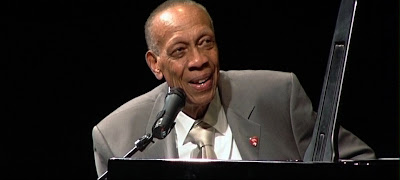 Above: Emmanuel Jal returns to Africa and the vestiges of civil war. Below: The rapper, in concert, transforms horror into art.
Above: Emmanuel Jal returns to Africa and the vestiges of civil war. Below: The rapper, in concert, transforms horror into art. Tribeca Film Festival 2008, April 23-May 4
Tribeca Film Festival 2008, April 23-May 4War Child
Directed by C. Karim Chrobog
With Emmanuel Jal
93 Minutes
By Mary Lyn Maiscott
These days, we are overloaded on the horrors of the world. If we hear “Sudan” or “Darfur” while thinking “Iraq,” we’re likely to tune it out. And that’s why we need people like Emmanuel Jal, a former child soldier who has spoken the unspeakable, turning the depravity he has experienced, and even committed, into art. This film tells the story of Jal’s improbable, tortuous journey from birth in a rural Sudanese village in the early 1980s (he does not know his birth date) to his current life as an international up-and-coming rap singer residing in London. Weaving historical footage into Jal’s narrative—including film of Jal himself as a self-possessed, talkative child in a refugee camp—the director, C. Karim Chrobog, shows us the devastating effect of war on one family (just try not to cry when Jal’s sister, separated from him for many years, finally reveals her own story). The wonder is that Jal, who admits to having been at times suicidal, not only survived but found a way to transform his terrors to the benefit of us all.
The film, beginning with the opening scene of Jal rapping to kids in an African classroom, is gripping, and the music lifts it to another level. Though some of it is hard to take, Chrobog, the son of a diplomat, has created an important and necessary document.






